Reported by Vanessa Chin and Fajar bt. Benjamin
Edited by Supriya Sivabalan
Picture credits: Sunway PCV
The Youth Mental Health Forum: Enhancing, Empowering and Strengthening Mental Health Services was held on the 11th of September in JC1, Sunway University. The forum was a part of the Return to Light: Mental Health and Suicide Prevention Campaign event that was held for 2 consecutive days on the 11th and 12th of September. The panellists consisted of
- The moderator of the night Dr. Alvin Ng, the HOD of Psychology Department from Sunway University,
- Deputy Minister of the Ministry of Health Malaysia (MOH), Dr. Lee Boon Chye
- Selangor State Assemblywoman Ms. Michelle Ng
- Chief Executive Officer of Sunway Education Group Dr. Elizabeth Lee
- Senior Lecturer from Taylor’s University, Dr. Indrani Thiruselvam,
- Analyst of Penang Institute, Ms. Lim Su Lin
- Sunway Alumni and ex-president of Sunway Peer Counselling Volunteers, Ms. Mazni Noah.
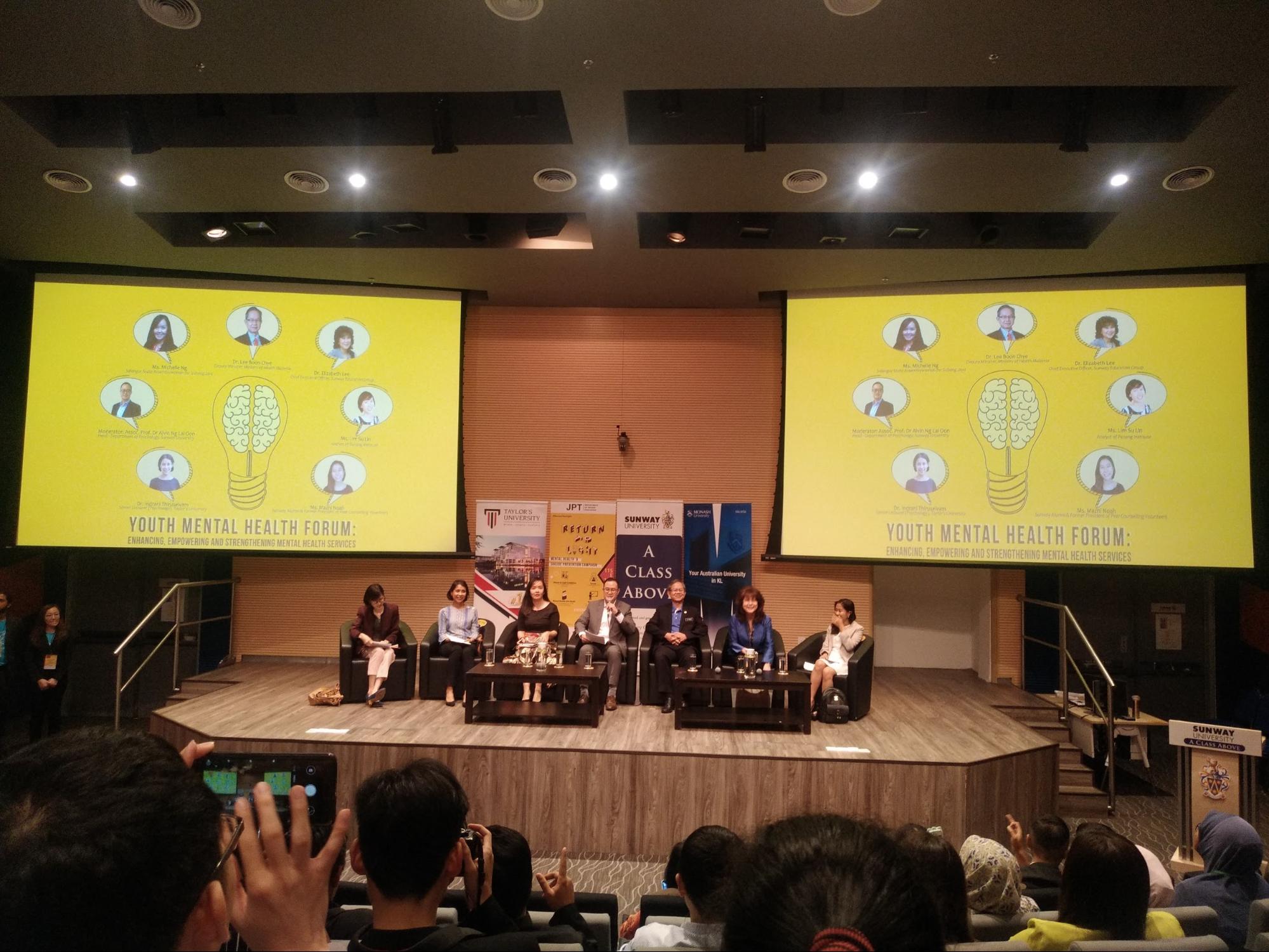
The night started off with the emcee, Anis Suraya, welcoming and conversing with the audience, introducing a few house rules as guests were ushered into the hall to get comfortable in their seats. After that, she introduced the guests of honour as they were ushered with a grand welcome into the hall. The event officially began with an introductory speech followed by the commencement of the forum.
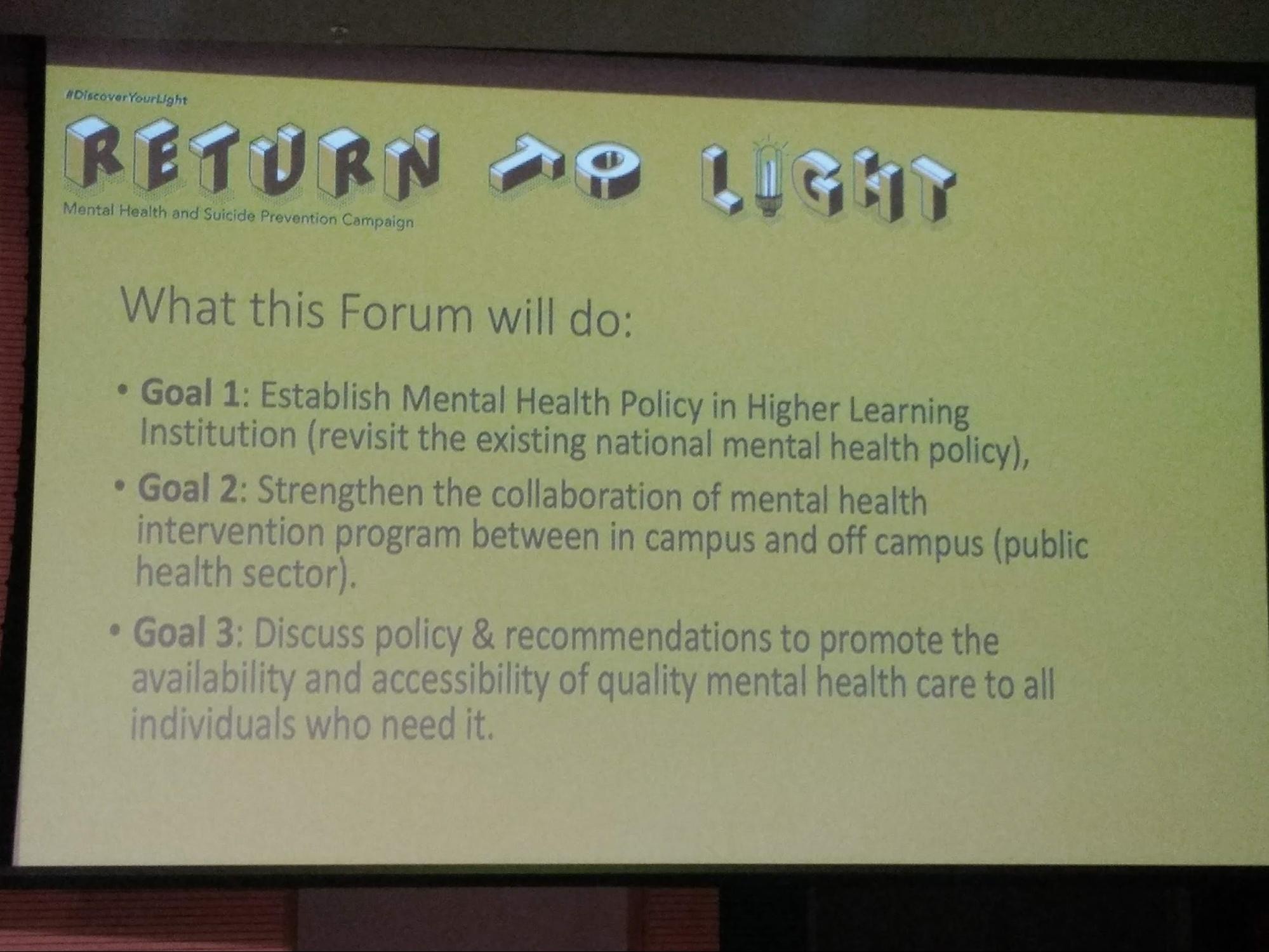
The moderator, Dr. Alvin Ng, began the talk discussing about the statistics from the National Health and Morbidity Survey and addressed on how “mental health is a major problem now and is going to continue to be a bigger problem as the years go by.” Issues regarding mental health have been visible for the past few years and the statistics are only going to continue, thus indicating a worsening problem if there is no preventative action taken to guide the public into addressing the importance of mental health. He continued to mention that the Ministry of Health cannot solve this problem alone, as the community also plays an important role in alleviating the ongoing issue.
The next question was directed to Dr. Elizabeth Lee about her initiatives and her engagement towards the importance of mental health among the students and staff of the Sunway Education Group. She mentioned that in the perspective of Sunway University students, there is definitely an increase in the demand for mental health support. She went on to explain the various actions that Sunway Education Group has done:
- Provide a 24-hour support assistance with some outsourcing for all students and staff of Sunway University. This support runs under the guidance of Sunway Counselling & Wellness where students and staff are encouraged to seek counselling when there is a need for help and advice.
- The initiative of Peer Counselling Volunteers or PCV, a peer support network for students on campus. Students are trained by counsellors to help their friends and others on a voluntary basis. This point was also later on highlighted by Ms Mazni Noah where she elaborated regarding the efforts of 3 different channels that PCV currently has — Let’s Chat Session (available for all students and staff), Peer 2 Peer Channel (an online platform for students to write in anonymously and converse privately), and appointment counselling sessions (appointment-based to meet with counsellors and peers).
- The WeCare team, comprising of staff and lecturers trained to look for signs of mental health issues among students.
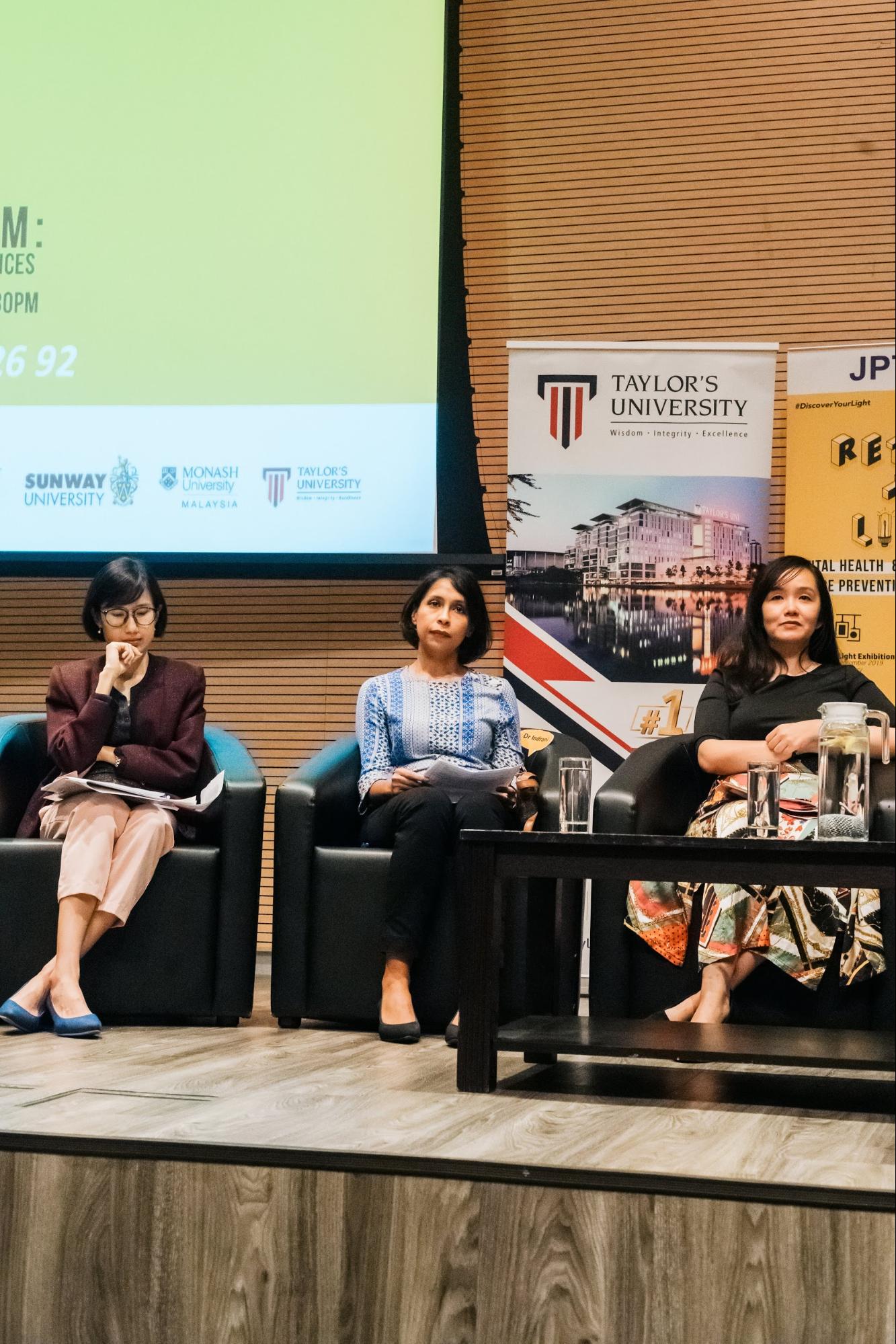
Moving on, the moderator next directed the spotlight to Dr. Indrani regarding her tackle on the challenges of students towards the transition from high school to college/university. She explains that students often struggle as everything becomes a new experience in terms of the change of environment and education style. Quoted from Dr. Indrani, she explained that with the less structured system in the higher level of education, it is challenging, for there is a different kind of independence that students need to adapt to, such as the faster learning pace, and students need to be independent by themselves with minimal guidance from lecturers. Work and assignments are very different from what they do or learn from high school and it becomes challenging for students to adapt as they have to be accountable for their studies and at the same time for their own personal life. Students would also need to learn how to manage time better, learn soft skills, and solve personal conflicts during this period of their lives.
This further leads to Dr. Indrani to share her advice on how to adapt and still maintain a healthy mind; “The signs or steps to self-care is clear. Mental health and physical health require similar care, for example sleeping well, having a balanced/healthy diet, exercising regularly, practicing mindfulness like meditating, setting realistic goals and engaging in healthy relationships”. Lastly,she continues to add that “all these require discipline from the student themselves. Achieving a positive and healthy mind comes from practising and committing to taking care of yourself daily”.
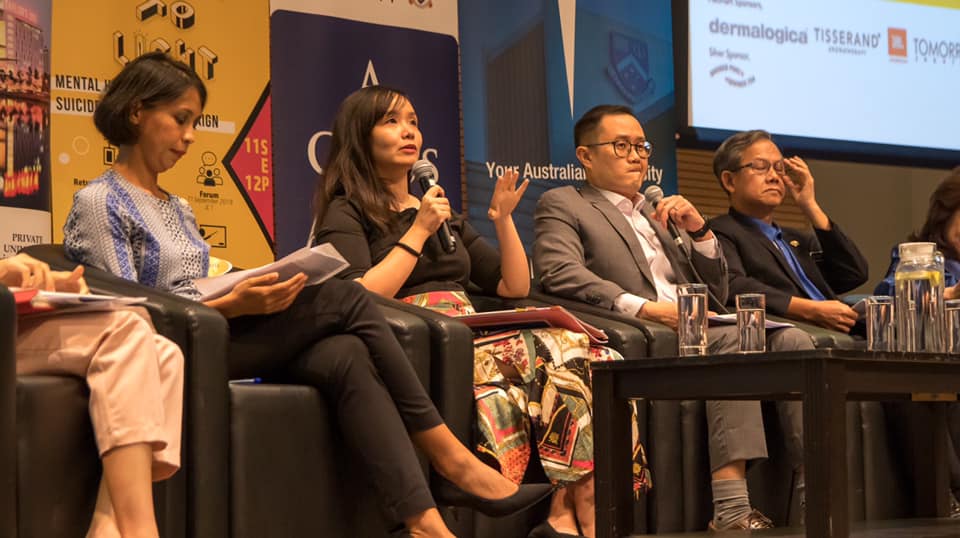
Y.B. Michelle was asked about the initiative she had taken in Subang to promote mental health awareness. Her first initiative are progammes for suicide prevention that take place every three months. The purpose is to train community leaders on how to see the signs and then provide “mental health first aid.” Adolescents tend to seek informal help from the people around them, and therefore it is important that they know how to address these issues. She also conducts resilience training for youths.
The next speaker was Ms. Mazni Noah, who spoke about how PCV is a platform for those who want to help others. PCV comprises of people from different backgrounds but all who have a common goal – to be a more compassionate person. They are trained in psychological first aid how to deal with traumatic events and counselling.
Following that, Ms. Lim Su Lin shared her thoughts as quoted, “There is a lack of support among the young people, leading to a more reluctant state for them to reach out. This leads to young people not knowing how to express themselves as they are not aware of the various methods/support that is available to help”. She also pointed out that there are three key issues when it comes to accessing help which is accessibility, stigma, and finances. She emphasised that there is a need for more support and help from private sectors in contradiction to public sectors, with the limitations to the number of patients they can treat and support at a time, especially when the budget is still not big enough from the government to cover such a big population.
Deputy Minister Dr. Lee supported Ms. Lim’s arguments with the various initiatives the MOH have done and will be taking in the coming future. Firstly, he mentioned that there is a problem that people suffering from mental health issues won’t go seek for medical assistance. He supported that statement with the various ways one can maintain a healthy mind through building relationships and social skills can also strengthen the ability for us to handle stress. He further went on to emphasise that “It is unrealistic to live life without stress. Not many understand that the problem arises when our ability to handle conflict and stress fails.” It is important to remove the stigma of mental health. “People need to know when to start seeking help before the problem worsens,” said Dr. Lee. To conclude, he suggested that “religious organisations can also play a part in this because religious organisations have the trust of the community”. This statement was then strongly supported by Dr. Elizabeth Lee, adding that “we should concentrate on having religion to help, rather than divide” which was responded by the audience with applause.
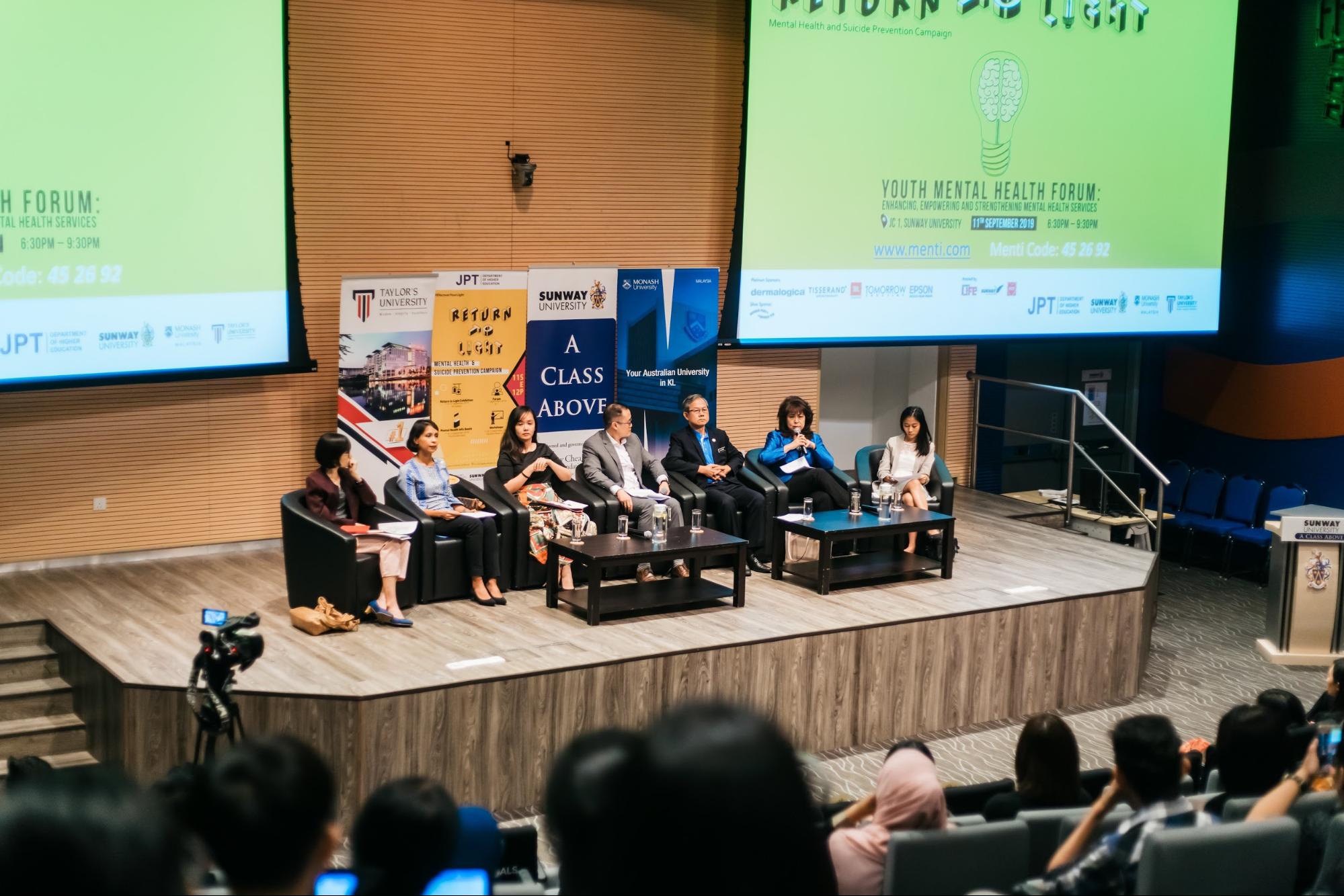
Dr. Elizabeth Lee added onto her points on the foreseeable future of Sunway University. Regarding the argument of transitioning from high school to university, she mentioned that there are various clubs and societies in Sunway that provides students with the platform to venture more into their interests and through that, make friends, gain confidence and be more comfortable with being in such a new environment. “One of the greatest stress areas, is not examinations but loneliness among students, making friends is not easy” quoted Dr Elizabeth. She further went on to explain how the whole concept of the Sunway Lagoon Passport came about, that was launched in conjunction with Sunway Friendship Week. It was to encourage the idea of going together with a friend or friends, to the theme park which will generally help in releasing stress overall.
One of the questions asked was regarding what were some initiatives that could be done to promote better mental health.
First, the deputy minister spoke about the 1000 public health clinics available in Malaysia with counselling services available, then Mazni Noah spoke up with an idea. Mental health care should be a compulsory subject in schools. In her opinion, this current era amplifies the need for comprehensive education on what mental health is, how it can be addressed and how to recognize the signs of poor mental health.
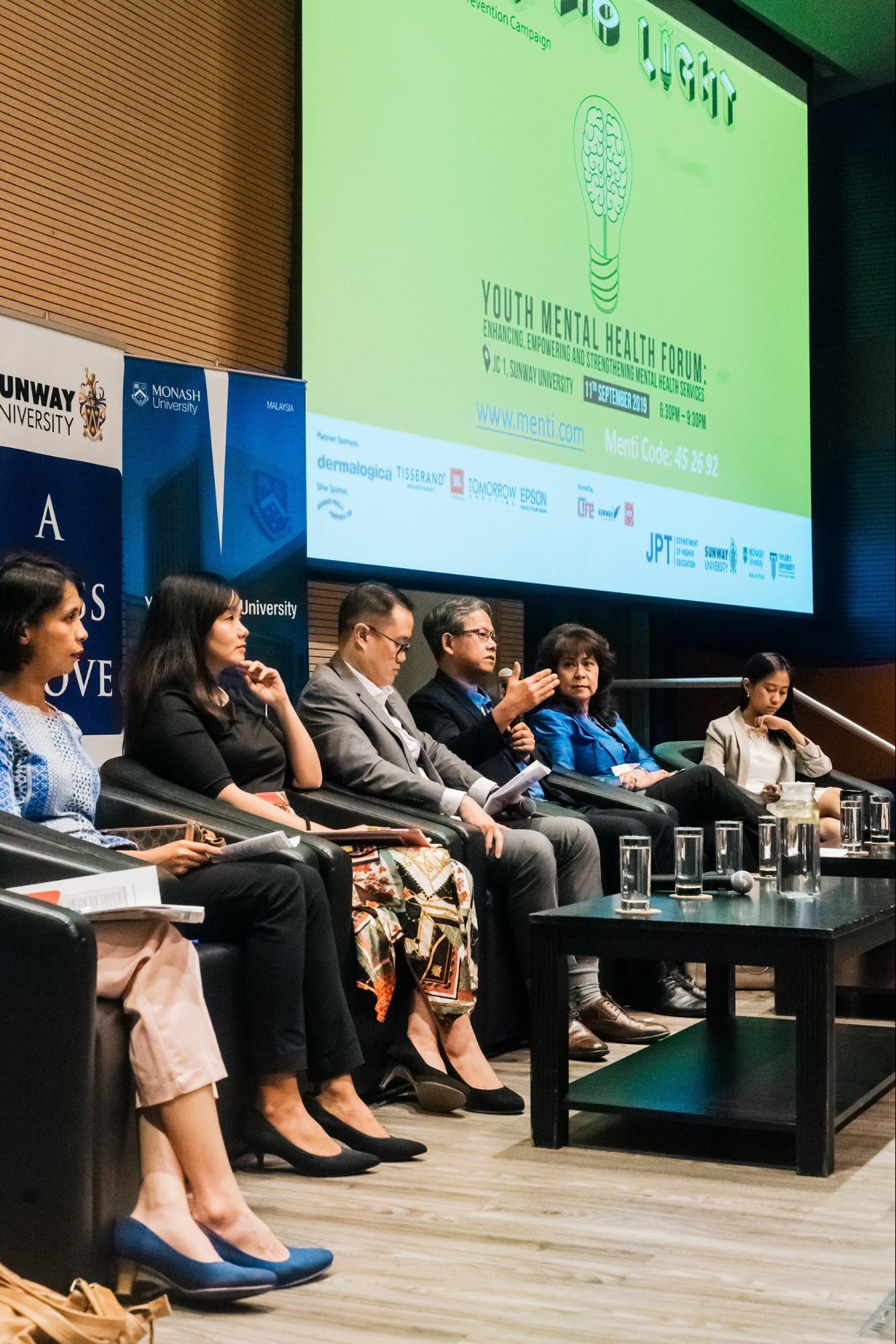
Dr Lee added on that everyone needs to be aware of the ‘1 in 3’ equation wherein 1 in 3 people suffer from poor mental health. Anyone can be facing the issue, so we must get rid of the stigma.
The Deputy Minister agreed with Mazni, suggesting that instead of a class, 2-hour training sessions could be conducted each term or it can be added as part of the curriculum to other existing subjects as the knowledge gained would be applicable for life.
YB Michelle piped in, “The reality is it feels like each of us is pulling a big sledge up a hill, when we need to work together to make a difference in this issue”. Dr Indrani also addressed the audience, telling us to find help if we felt like we were struggling. She also pointed out that mental health is a pattern of behaving and thinking that has formed after years and that there is no quick fix. Treatments sought must be evidence-based.
Finally, Miss Lim Su Lin stated that every human being wants to be heard. One takeaway is that each and every one of us can play a part in building society.
The forum continued with a Q&A session with the audience. The panellists were given a few questions from the floor and was given a small amount of time to answer the questions.
One of the questions was regarding government initiatives to promote mental health.
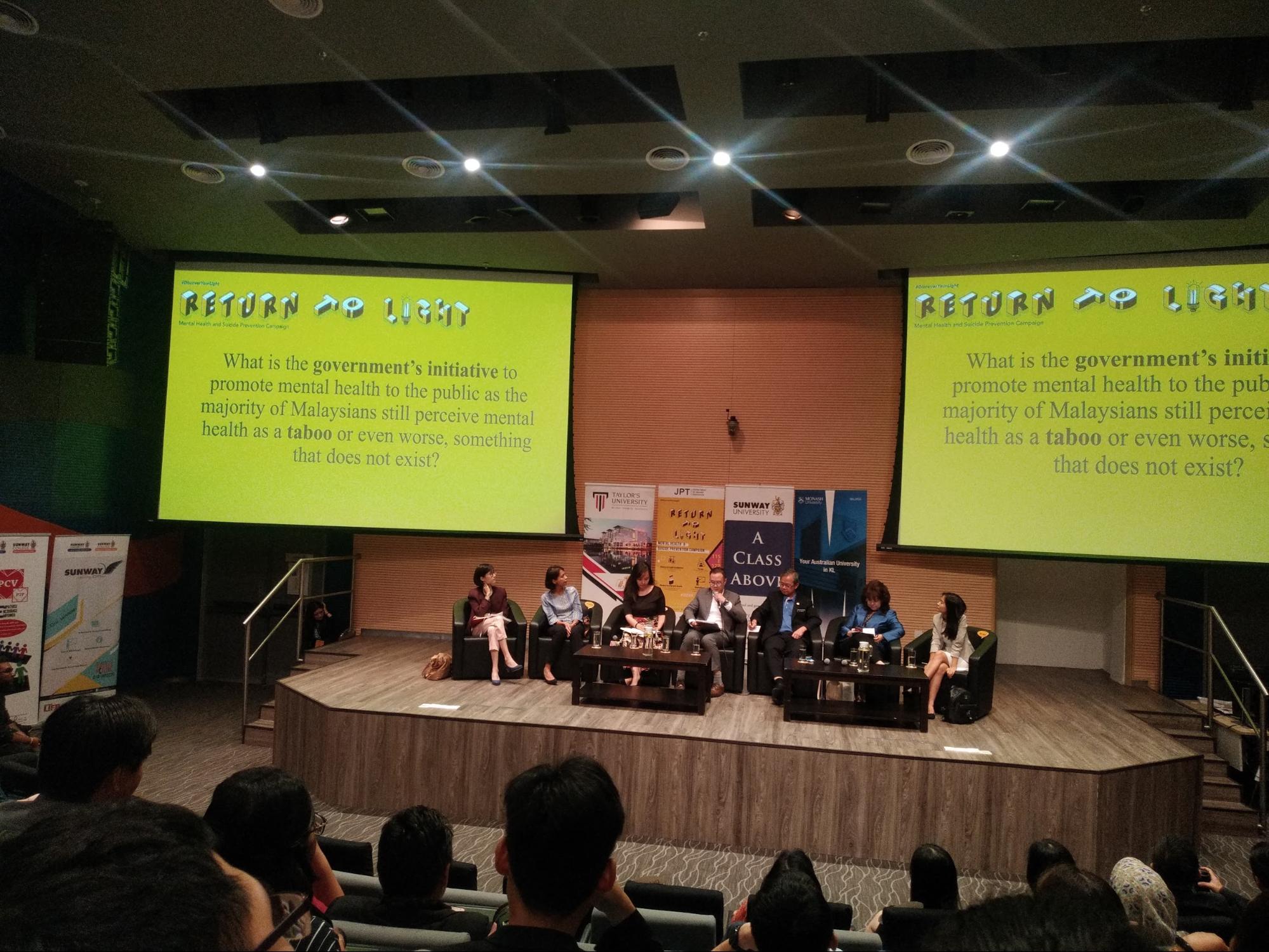
The deputy minister listed out a few, including Akrab for workplace which is a community support system, mental health screenings for the B40 group, again, the 1000 health clinics with family medicine practitioners trained to counsel and he even mentioned faith groups. YB added on about Talian Kasih which is a toll-free hotline for those in need of emergency counselling.
Another question was regarding introverts who may not be able to access professional help but are too afraid to talk to their family and friends.
Ms.Mazni stepped up to encourage anyone who feels they cannot trust the people around them to join new circles, join clubs in college or make new friends in class, even talk to people online as there will always be the right crowd for each individual.
The final question answered was directed to Dr. Lee and it questioned what Sunway has done in light of its close ties with big auditing firms to address how auditors mental well being is completely disregarded.
Dr. Lee drew applause from the crowd as she explained how Sunway Group had put their foot down and demanded that the auditing firms practice better policies on working hours. “You can’t work people to death!” she exclaimed passionately. She also pointed out that every profession has its stresses and that you cannot live a stress-free life, but that regarding the abnormally demanding working hours, change has been set into motion.
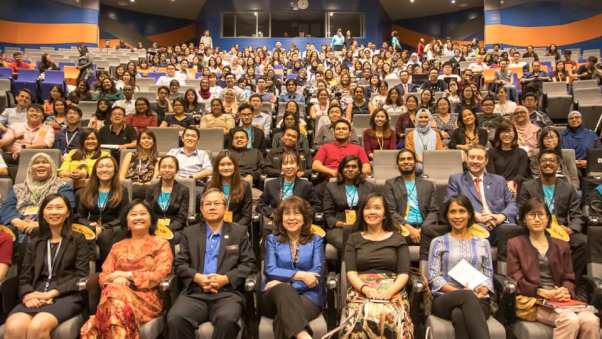
The night ended with a photography session of the guests of honour and the audiences attended. My biggest takeaway from this forum from what I understood is that all panellists shared a common understanding which is that “mental health is a collective responsibility”. Each and every one of us are responsible in helping ourselves and the people around us. It is not only the responsibility of counsellors, practitioners or medical professionals to be constantly aware of the increasing statistics regarding people suffering from mental health issues, but it is also our responsibility to play a part in taking care of ourselves and being more aware of the signs that we could pick up on and paying more attention to them.
Feel free to reach out to the Sunway Counselling Unit by walking in or calling 03-7491 8622. If you wish to reach out to an external group of people, Befrienders is a good alternative. Contact them at 03-7956 8145. Always seek help if you need it – no situation is ever “too small”.



